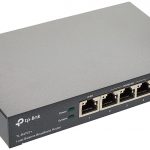
Modems and routers may look similar, but they serve different functions. A modem connects the ISP-provided Internet access with your home network. A router, on the other hand, is responsible for your home network.
In other words, it connects all your devices together and provides them with Internet access coming from the modem. You will learn more about the differences below.
Modems
The name modem comes from the verb modulate. It modulates and demodulates the analog signal from your ISP and transforms it into digital data that can be accessed by your computer, phone, or other devices.
Almost all ISPs provide their users with modems, but they are not always free. You can check if your ISP charges you a fee for the modem by checking your bill. If they do, it would be a good idea to buy a modem because you will save money in the long run. Modems can last for many years before needing to be changed.
While modems don’t have Wi-Fi, many of them are actually modem and router combo devices that do. They perform both the functions of the router and the modem so that you don’t have to buy two devices. They are convenient, but it’s better to have both a modem and a router because routers are replaced more often to get the latest tech and features, whereas modems are all similar.
Pros; Cons of Modems
Modems connect you to your ISP and can convert the signal into a digital one. They can also last much longer than routers because they seldom get new tech that may improve the performance.
The disadvantages are that they can’t create LANs, don’t have Wi-Fi, and can connect only one device to the Internet. Also, some modems are proprietary, meaning that you are limited to only the one provided by your ISP.
Routers
Much like modems, the name Router is self-explanatory. They are responsible for routing data among all your home devices and gadgets and between them and the Internet as well. The router, together with all the connected devices, is what you would call a home network.
Routers have multiple Ethernet ports, with one being reserved for the Ethernet cable that comes from your modem. That port is usually labeled as “WAN”, has a different symbol, or is in a different color. The other Ethernet ports are for all your other devices, including repeaters or routers that you use as access points to extend your Wi-Fi range.
You are more likely to be buying a router yourself rather than being provided one by your ISP. Unless you have a modem and router combo device, you will need a router to connect your phone, computer, and other devices around the house. Also, you should probably invest more money in your router than your modem because the router can have a huge impact on your network performance.
Just like with anything else in life, the more you pay, the more you get. You don’t have to overpay to get a decent connection, though. Get a router that meets all your needs. Make sure that the maximum bandwidth is fitting for your connection and that it supports a good number of devices.
The one feature that you should look for in a router is that it has support for dual-band Wi-Fi. This greatly improves the maximum available bandwidth as well as the speeds, signal strength, and overall stability. 2.4 GHz has a much longer transmission range, but it is also much slower than 5 GHz.
Pros; Cons of Routers
Routers create a home network (LAN), split and manage the Internet connection across all your devices, have Wi-Fi, have a firewall, and can also connect (or even have a built-in) VPN.
However, routers can’t connect your home network to the Internet because they can’t modulate and demodulate the analog signal from your ISP. They also have to be upgraded every so often if you want to have all the latest features and tech.
Conclusion
Both routers and modems are irreplaceable pieces of tech in our everyday lives. The modem has only one main function, which is to allow you to connect to the Internet. Modems only have a single Ethernet port that is reserved for your router, which is why most ISPs use modem and router combos.
Routers are responsible for creating a home network that will connect all your devices together. It also connects them to the Internet, but only thanks to the modem. The router works in harmony with the modem so that you can do your job, stream TV shows and movies, play online video games, browse, and everything else.


